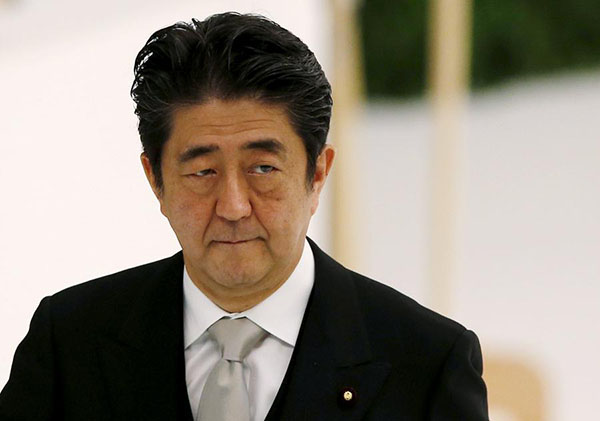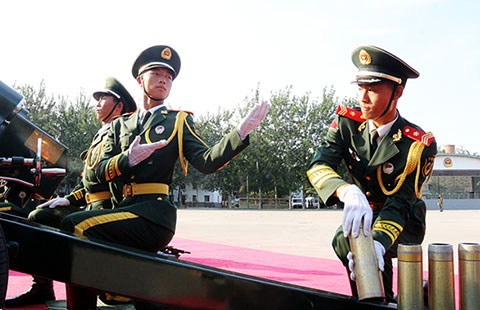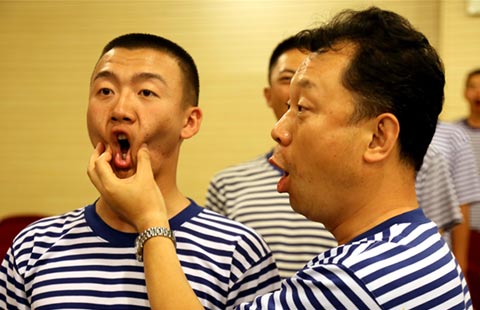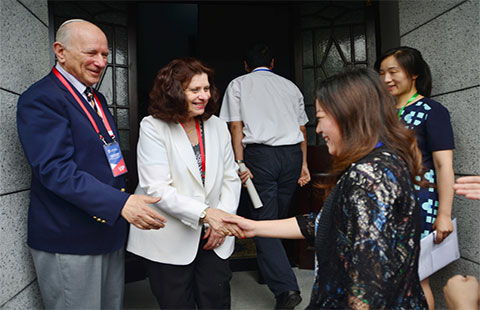Reaction to Ban's visit sets Abe on wrong side of history
Updated: 2015-08-31 08:11
(China Daily)
|
||||||||
 |
|
Japan's Prime Minister Shinzo Abe attends a memorial service ceremony marking the 70th anniversary of Japan's surrender in World War Two at Budokan Hall in Tokyo August 15, 2015. [Photo/Agencies] |
The Japanese government's "concern" about UN Secretary-General Ban Ki-moon's visit to Beijing betrays the narrow-mindedness of the Shinzo Abe administration and its obstinacy in clinging to wrong perceptions of history.
After the announcement that the UN chief would attend the upcoming series of events commemorating the end of the World War II in Beijing this week, a Japanese foreign ministry official said Tokyo has asked the world body to "take a neutral position on events that focus mostly on the past" and expressed "strong displeasure" with the UN chief's attendance.
Such an open display of displeasure is against diplomatic etiquette, not to mention that Japan's concerns are ill-grounded as well as unreasonable.
Abe turned down China's invitation to attend the commemorations and let slip a historic opportunity to effect an immediate reconciliation in Northeast Asia over historical issues.
The Japanese government's bashing of Ban over his attendance is based on its desire for others to forget the unpleasant past just as it is trying to get the Japanese public to do. Such self-deceiving self-righteousness will only further isolate Japan from the international community on the issue of history.
Some 30 heads of state and government leaders, including Russian President Vladimir Putin and Republic of Korea President Park Geun-hye, will attend the military parade on Sept 3. The attendees also include government representatives from 19 countries and the heads of 10 international organizations, including UN chief Ban.
Like Ban, these dignitaries see the upcoming commemorations as an important way for us to reflect on the past, look at the lessons we have learned and how we can move ahead to a brighter future based on these lessons.
China has repeatedly said this week's activities are not targeting specific countries, not Japan or its people. But it seems Japan still wrongly believes the parade staged in Beijing will whip up anti-Japanese sentiments.
If there are some anti-Japanese sentiments in the region or elsewhere, they have been triggered by Japan's own unrepentant attitude towards and constant whitewashing of its war atrocities. And Abe has given up one opportunity after another, including his attendance at the Beijing parade, to quell those unfavorable sentiments towards Japan.
It is both unwise and counterproductive for Japan to harbor even an iota of the intention to place itself on the opposite side of countries and international organizations that have agreed to send representatives to Beijing this week.

 Bolt 'somersaults' after cameraman takes him down
Bolt 'somersaults' after cameraman takes him down
 A peek into daily drill of ceremonial artillery unit
A peek into daily drill of ceremonial artillery unit
 93-year-old's murals save Taiwan's 'Rainbow Village'
93-year-old's murals save Taiwan's 'Rainbow Village'
 Top 8 novel career choices in China
Top 8 novel career choices in China
 Hairdos steal the limelight at the Beijing World Championships
Hairdos steal the limelight at the Beijing World Championships
 Chorus of the PLA gears up for Sept 3 parade
Chorus of the PLA gears up for Sept 3 parade
 Iconic Jewish cafe 'White Horse Coffee' reopens for business
Iconic Jewish cafe 'White Horse Coffee' reopens for business
 Beijing int'l book fair opens new page
Beijing int'l book fair opens new page
Most Viewed
Editor's Picks

|

|

|

|

|

|
Today's Top News
China takes historical silver in men's 4x100m
Surviving panda cub at National Zoo is male
China eases rules for foreigners to buy property
Ministry denies troops sent to reinforce DPRK border
Stem cell donor offers ray of hope for US boy with leukemia
All creatures great and small help keep V-Day parade safe
China not the only reason global stock markets are in a tailspin
Market woes expected to delay Fed hike
US Weekly

|

|






